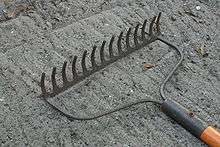Definify.com
Webster 1913 Edition
Rake
Rake
Rake
Rake
,Rake
,Rake
,Rake
,Webster 1828 Edition
Rake
RAKE
,RAKE
,RAKE
,RAKE
,RAKE
, v.i.Definition 2026
rake
rake
English
 Wooden rake
|
 Heavy duty rake
|
Noun
rake (plural rakes)
- A garden tool with a row of pointed teeth fixed to a long handle, used for collecting grass or debris, or for loosening soil.
- 1879, Richard Jefferies, The Amateur Poacher, chapterII:
- Orion hit a rabbit once; but though sore wounded it got to the bury, and, struggling in, the arrow caught the side of the hole and was drawn out. […]. Ikey the blacksmith had forged us a spearhead after a sketch from a picture of a Greek warrior; and a rake-handle served as a shaft.
- 1879, Richard Jefferies, The Amateur Poacher, chapterII:
- (Ireland, slang) A lot, plenty.
- Jim has had a rake of trouble with his new car.
- (rail transport) A set of coupled rail vehicles, normally coaches or wagons.
- The train was formed of a locomotive and a rake of six coaches.
- (cellular automata) A puffer that emits a stream of spaceships rather than a trail of debris.
- The scaled commission fee taken by a cardroom operating a poker game.
- A toothed machine drawn by a horse, used for collecting hay or grain; a horserake.
- (mining) A fissure or mineral vein traversing the strata vertically, or nearly so.
Synonyms
- (rail transport): consist
Derived terms
Translations
|
|
|
|
Verb
rake (third-person singular simple present rakes, present participle raking, simple past and past participle raked)
- To use a rake on (leaves, debris, soil, a lawn, etc) in order to loosen, gather together, or remove debris from.
- We raked all the leaves into a pile
- To search thoroughly.
- Detectives appeared, roped the curious people out of the grounds, and raked the place for clews. -- Captain John Blaine
- Dryden
- raking in Chaucer for antiquated words
- Jonathan Swift
- The statesman rakes the town to find a plot.
- To spray with gunfire.
- the enemy machine guns raked the roadway
- To claw at; to scratch.
- Her sharp fingernails raked the side of my face.
- Wordsworth
- like clouds that rake the mountain summits
- To gather, especially quickly (often as rake in)
- The casino is just raking in the cash; it's like a license to print money.
- (intransitive) To pass with violence or rapidity; to scrape along.
- Sir Philip Sidney
- Pas could not stay, but over him did rake.
- Sir Philip Sidney
Synonyms
- (search thoroughly): comb, go over or through with a fine-tooth comb, scour
Translations
|
Etymology 2
From Middle English raken, from Old English racian (“to direct, rule, govern, control; take a course or direction, go forward, move, run; hasten”), from Proto-Germanic *rakōną (“to choose a direction, run”), from Proto-Indo-European *h₃reǵ- (“to straighten, direct”). Cognate with Dutch raken (“to hit, touch, reach”).
Noun
rake (plural rakes)
- Slope, divergence from the horizontal or perpendicular.
- (geology) The direction of slip during fault movement. The rake is measured within the fault plane.
- (roofing) The sloped edge of a roof at or adjacent to the first or last rafter.
Verb
rake (third-person singular simple present rakes, present participle raking, simple past and past participle raked)
- (intransitive) To proceed rapidly; to move swiftly.
- (obsolete, transitive) To guide; to direct
- (intransitive) To incline from a perpendicular direction.
- A mast rakes aft.
Etymology 3
Shortening of rakehell, possibly from rake (etymology 2) (“to proceed rapidly”).
Noun
rake (plural rakes)
- A man habituated to immoral conduct.
- The Spectator
- We now have rakes in the habit of Roman senators, and grave politicians in the dress of Rakes. — the Spectator
- The Spectator
Synonyms
Translations
Verb
rake (third-person singular simple present rakes, present participle raking, simple past and past participle raked)
- (Britain, dialect, dated) To walk about; to gad or ramble idly.
- (Britain, dialect, dated) To act the rake; to lead a dissolute, debauched life.
- (Can we find and add a quotation of Shenstone to this entry?)
Etymology 4
From Middle English, from Old Norse rák (“trail”), from Proto-Germanic *rēkō, *raką, *rakō, *rakǭ (“file of tracks, line”), from Proto-Indo-European *(o)reg'-, *(o)reg'a- (“to straighten, direct”). Cognate with Icelandic rák (“streak, grazing”), Icelandic raka (“strip, series”), Norwegian røk (“grazing”), Norwegian rak (“wick”), Old English race, racu (“a run, riverbed”).
Alternative forms
Noun
rake (plural rakes)
- (provincial, Northern England) A course; direction; stretch.
- (provincial, Northern England, for animals) A range, stray.
- a sheep-raik = a sheep-walk
Verb
rake (third-person singular simple present rakes, present participle raking, simple past and past participle raked)
- (provincial, Northern England) To run or rove.
References
- J[ohn] A. Simpson and E[dward] S. C. Weiner, editors (1989) The Oxford English Dictionary, 2nd edition, Oxford: Clarendon Press, ISBN 978-0-19-861186-8.
Anagrams
Dutch
Pronunciation
Adjective
rake
- Inflected form of raak
Verb
rake
- (archaic) singular present subjunctive of raken
Scots
Alternative forms
- raik, rayk
Etymology
From Middle English raken, from Old English racian (“to direct; rule; take a course or direction; run”).
Verb
rake (third-person singular present rakes, present participle rakin, past rakit, past participle rakit)
- To proceed with speed; go; make one's way
- To journey; travel
- (of animals) To move across or search for pasture; wander; roam
- To stray